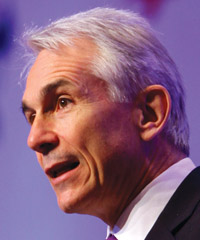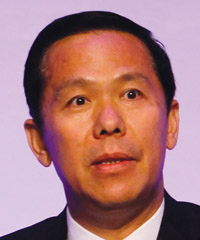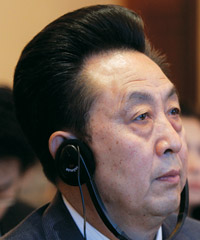IATA AGM Preview
MORE GLOOM
That was the message in a nutshell at the 68th International Air Transport Association (IATA) annual general meeting and world transport summit, held in Beijing last month. But throughout it all, the Asia-Pacific is standing strongest
July 1st 2012
Last year’s news was bad at the IATA annual meeting. This year’s news was even worse. Read More »
 |
| 'A few months ago, an oil price crisis was the biggest risk. Now all eyes are back on Europe. The industry’s profitability is on a knife edge' |
| Tony Tyler Director General IATA |
More than 700 airline chiefs and industry executives focused on familiar themes; the vagaries of the fuel price, the verbal fisticuffs between the European Union (EU) and the rest of the world over its controversial emissions trading scheme (ETS), the economic turmoil, particularly in Europe, that is affecting the industry and ways to stop greedy governments from treating aviation as a cash cow with its taxes and charges.
But it was statistics that brought home to one of the world’s most highly capitalized industries the fine line it is treading. After reaching a record $15.8 billion profit two years ago, with a net profit margin of 2.9%, the industry is forecast to slump to a $3 billion profit this year with a 0.5% net margin.
But as the dark clouds rolled by one constant shone through – the strength of the industry in the Asia-Pacific. It’s true that bottom lines were not as buoyant as last year, but the region is still expected to record a $2 billion net profit for 2012, more than 66% of the total global profits.
Little wonder that the Asia-Pacific, driven by the powerhouse that is China, is regarded as number one in the world for growth in the aviation industry and all projections point to the gap widening in the years ahead.
It was perhaps significant that this year’s AGM was held in Beijing. The Chinese airlines and their executives were out in force and active at all levels, not always the case in the past. They were certainly taking no prisoners when it came to discussing the EU’s ETS. “We will not provide [the EU] with [emissions] data,” said the secretary general of the China Air Transport Association, Wei Zhenzhong.
But the scene was set by IATA director general and former Cathay Pacific Airways chief executive, Tony Tyler, with his state of the industry address. He has impressed in his first year and earned praise from some of those hardest to please. These included some of the Gulf carriers who last year complained of a lack of transparency in the way IATA conducted its business.
There have been a number of wide ranging changes within the association. But in the industry at large the problems remain the same.
 |
| Liu Shaoyong, chairman China Eastern Airlines: China has one of the most open markets in the world for foreign businesses |
Tyler told the annual general meeting that the industry was fragile. The crisis in Europe was now a bigger concern among airlines than rising oil prices.
“In the last decade, airline revenues totalled $4.6 trillion. We were among the world’s fastest growing industries. But our best annual profit margin of the century so far was 2.9%. And the overall result has been a net loss of $16 billion,” he said.
“2012 is another challenging year. We expect revenues of $631 billion, but a profit of just $3 billion. That’s a 0.5% net margin …and that projection comes with some serious downside risks.”
IATA’s latest revised industry outlook for this year, released by IATA chief economist Brian Pearce, said a fall in oil prices, stronger than expected growth in passenger traffic and a bottoming out of the freight market were driving some improvements in the profitability outlook.
“However, this is offset by the continued and deepening European sovereign debt crisis, which has led markets to expect a further deterioration and damage to economic growth, the adverse impact of which has been built into this forecast,” said Pearce.
It means operators are facing the second year of declining returns since airline profits peaked in 2010 at $15.8 billion, with a net profit margin of 2.9%. This year’s expected poor return was preceded, in 2011, by a year when industry profits fell to $7.9 billion for a 1.3% net profit margin.
The outlook for European, Asia-Pacific and Middle Eastern carriers has been downgraded. According to the forecast, the Asia-Pacific airlines will still make the largest contribution, some $2 billion, to industry profits, although there has been a $0.3 billion downgrade from the previous outlook due to a weak first quarter performance.
This is less than half the $4.9 billion profit that the region delivered in 2011 and a quarter of the $8 billion achieved in 2010.
Asian carriers make up about 40% of the global air cargo business and the weakness of this market in 2011 was the reason why there was a large decline in the region’s profits. There has been little sign of the region’s airlines benefitting from the modest upturn in cargo markets this year although China Airlines president, Sun Huang-Hsiang, did express confidence the slow cargo market has bottomed out and was set to rebound.
 |
| 'Our [cargo] outlook for the year is cautiously optimistic |
| Sun Huang-Hsiang President China Airlines |
“Our outlook for the year is cautiously optimistic. The worst case scenario is if the fuel price goes up and cargo comes down. But that will affect all airlines since we are all in the same boat,” he said.
However, IATA’s forecast said the slowdown in the Chinese and Indian economies is another factor in the slow growth environment. Nevertheless, it believes the region will benefit from stronger growth in aggregate passenger and cargo traffic this year, as a result of the rebound in demand in the Japanese market after the tsunami and earthquake last year.
“Regional demand is expected to grow at 3.9%, above the anticipated 3.3% growth in capacity, providing some protection to airline profits,” said the forecast.
In Beijing, the single most worrying issue for airline chiefs was undoubtedly Europe’s fragile economic situation. IATA’s revised forecast was based on a weaker European economic environment than previously forecast in March. But the forecast assumes that the worsening of the Eurozone situation is limited and does not deteriorate into a widespread banking crisis, something that is far from assured.
It also assumes the U.S. economy continues to recover, but at a mediocre pace, and that Chinese economic growth slows with a hard landing avoided by policy stimulus.
Pearce warned if the recession swept across Europe, there was a serious risk to the financial viability of some airlines. “We have seen some airlines go out of business and there is a clear possibility it will continue,” said Pearce.
He made it clear all the risks to the forecast are primarily on the downside. “While the forecast is built on the market’s expectation that the sovereign debt crisis in the Eurozone will intensify, the risk of more severe economic weakness in the event of a broader Eurozone banking crisis could easily wipe out industry profits,” he said.
“Similarly, the recent softening in oil prices could easily reverse should the ongoing dispute with Iran deteriorate, causing fears of a disruption in oil supply to resurface.”
Nevertheless, Cathay Pacific chief executive, John Slosar, hoped the recent drop in oil prices would provide some relief to airlines around the world.
| IATA offers a reality check IATA director general, Tony Tyler, made it clear at the annual meeting he won’t be giving up on the fight to eliminate costly taxes and charges such as the UK’s Air Passenger Duty (APD) which has grown from $520 million in 1995 to $4.1 billion today. Or the recent 346% hike in airport charges at India’s Delhi airport. Also being challenged are a 161% increase in airport charges and a 70% increase for air navigation fees in South Africa. Tyler is leading a major new campaign to convince governments around the world lower taxes and charges are good, not just for airlines, but national economies, trade and jobs growth (see Get Real). |
Cathay recently issued a profit warning to its shareholders, moved to reduce capacity on long-haul routes and retire older B747-400 aircraft sooner than expected. “Very positively, we have seen a real move down in the oil price. That will be better for aviation, but a lot better for the world economy,” said Slosar.
Tyler said there had been no let-up in the volatility of the economic environment. “A few months ago, an oil price crisis was the biggest risk. Now all eyes are back on Europe. The next months are critical and the implications are big,” he said.
“The industry’s profitability is on knife edge. If the bottom line worsens by even the equivalent of just 1% of revenue, our $3 billion profit very quickly becomes a $3 billion loss.”
One reason the Beijing AGM attracted so many delegates – it was also covered by 350 media – was the huge interest among foreign airlines in the potential of the Chinese market. While the country’s economy has slowed it is still growing way ahead of any other market.
IATA organized a panel on “Doing Business in China”. Liu Shaoyong, chairman of China Eastern Airlines, who was on the panel, said executives of any foreign carrier only needed to place themselves at a railway station in China to give them good reason why they should enter the Chinese market.
China was among the countries in the world with the most open markets for foreign businesses, he said.
Next year’s 69th IATA AGM will be held in Cape Town, South Africa.
GET REAL
Campaign calls for governments to stop using airlines as a cash cow and appreciate their contribution to the economy
 |
| Jeff Poole, IATA director, industry charges, fuel and taxation: need to present governments with hard facts |
Airlines have launched into a new worldwide campaign to try and convince reluctant governments to stop using the industry as a cash cow and to ease regulatory pressures, which are preventing carriers from making sustainable profits.
Their arsenal consists of 59 country reports compiled by the International Air Transport Association (IATA) and consultancy Oxford Economics, each carefully outlining the economic benefits of a successful airline sector. The aim, according to IATA director, industry charges, fuel and taxation, Jeff Poole, is to finally convince “governments that don’t get it” just how beneficial airlines can be to their economy.
“The starting point is to present governments with hard facts,” he said, which is why six months of effort was put into compiling the reports.
“As an industry we continue to slide backwards under the pressure of more taxes, more regulation and more difficulty in creating appropriate infrastructure.
“Do governments get it? How can we be more proactive? Governments should use aviation as a strategic asset. It should be a positive thing, not something to be suppressed or treated as a cash cow for revenue.
“The point is this is not for the benefit of aviation. This is not a self-serving statement by aviation, but showing governments if they treat aviation in a more favourable way it is for their benefit and the benefit of their citizens.”
It was a message IATA director general, Tony Tyler, also pushed in his state of the industry address at the opening of the IATA annual general meeting and world air transport summit in Beijing. “Our industry’s license to grow is earned through working with governments to constantly make flying even safer, more secure and more sustainable,” he said.
“Now we need an agenda to achieve tax regimes that do not kill growth, regulation that facilitates growth and infrastructure that can efficiently accommodate growth. Doing so will enable the substantial economic benefits - jobs and growth - that global connectivity provides.”
Tyler pointed out that in 2011, aviation safely transported some 2.8 billion passengers and 48 million tonnes of cargo, with the value of goods transported by air estimated to be $5.3 trillion, equal to 35% of the value of all goods traded internationally.
A recent study by Oxford Economics confirmed that aviation’s contribution to the global economy supports 57 million jobs and some $2.2 trillion in economic activity.
Oxford Economics projected that aviation will grow about 5% annually to 2030. That would see passenger numbers rise to 5.9 billion and cargo shipments could triple to nearly 150 million tonnes.
This connectivity would support 82 million jobs and $6.9 trillion of global GDP. If growth is held back by even one percentage point, the global economy would forfeit 14 million jobs and over $1 trillion in GDP contribution from aviation, said Tyler.
“Taxes dampen growth with a knock-on effect on jobs and the broader economy. Bluntly put, making connectivity more expensive destroys jobs and slows economic growth,” he said.
“The United Kingdom had to admit this when the recent increase in its £2.6 billion Air Passenger Duty (APD) threatened direct connectivity to Northern Ireland.
“With inward investment and jobs at stake, the government reduced international APD for Northern Ireland. Regrettably, the government increased this job-destroying tax across the rest of the United Kingdom instead of abolishing it altogether.”
He also cited the positive impact of low tax regimes. “Hong Kong, Singapore and the United Arab Emirates are among governments building their economies around air connectivity. The result is a virtuous circle. They are great markets for airlines. Businesses prosper from connectivity. And governments reap the benefits of increased employment and a stronger tax base,” said Tyler.
In a briefing later, Poole said unlike other industries IATA was not asking for special measures or financial support. “We are merely asking governments, effectively, to get out of the way and allow aviation to conduct its business in the way that many other industries do,” he said.
China turns up the heat on EU
 |
| 'Chinese airlines are unanimous on this issue. We won’t provide the [emissions] data' |
| Wei Zhenzhong Secretary General China Air Transport Association |
Airlines, led by China’s major operators, have increased pressure on European authorities over its aviation emissions trading scheme (ETS), which began on January 1 this year, with fears the international row will lead to a trade war.
It is “an extremely charged situation”, said International Air Transport Association (IATA) director aviation environment, Paul Steele. “The last thing we want as an industry is a trade war and, secondly, retaliatory action being taken against carriers around the world, tit-for-tat measures … we are doing everything we can to avoid that.”
Steele said there had been warning signs; rumours of states slowing down approval of purchases of new aircraft from European manufacturers, or limiting the number of overflights for European carriers. “We are calling on all parties to get back round a table at ICAO [International Civil Aviation Organization] and find a solution,” he said.
Speaking in Beijing at IATA’s annual summit, the association’s director general, Tony Tyler, said airlines needed globally-coordinated, positive market-based measures to meet their emissions targets, but the extra-territorial EU ETS was not a stepping stone on the way.
“It’s a polarizing obstacle that is preventing real progress. China is at the forefront of the opposition to the European ETS. Its carriers are forbidden from participating. Sustainability should unite the world with common purpose, not divide it with affronts to sovereignty that risk a trade war, a war that nobody wants and from which no winner can emerge.”
Tyler said there was common ground and everyone - including Europe - agreed the only real solution is a global agreement through ICAO at its 2013 assembly.
“Such an agreement, however, is impossible under current conditions. Europe seems more committed to implementing its ETS unilaterally than to sincerely negotiating a multilateral agreement. For Europe’s international counterparts it’s like being asked to negotiate with a gun to their head,” said Tyler.
More than 30 countries, including India, Russia and the U.S., have joined “a coalition of the unwilling” considering retaliatory action. And Chinese carriers made it abundantly clear in Beijing they won’t back down.
Wang Changshun, chairman of Air China, said his airline would continue to follow the government’s policy of fighting the EU ETS, which, it has been estimated, would cost the country’s carriers $124 million in 2012.
Liu Shaoyong , president and chairman of China Eastern Airlines, also insisted it would remain in line with the government’s stance. Eight Chinese airlines and two Indian carriers have failed to submit carbon emission data from last year, demanded by the EU regulations. They face the threat of fines or even having their aircraft impounded in Europe for non-compliance.
But the China Air Transport Association (CATA) warned China will take swift counter-measures that could include impounding European aircraft. “Chinese airlines are unanimous on this issue. We won’t provide the [emissions] data,” said CATA secretary general, Wei Zhenzhong, during IATA’s Beijing summit.
IATA’s Steele said the issue wasn’t about money, but about sovereignty and European regulators charging for emissions outside their own airspace.
Next April, airlines are supposed to surrender their emissions permits to their competent authority, one of the 27 member states of the EU. But it isn’t until October next year when ICAO meets and discusses its work and negotiations with member states on a global ETS scheme.
“There is a disconnect between those two timelines,” said Steele. “That’s what is driving calls by some countries for the EU to look at delaying [the April compliance deadline] to enable the ICAO discussions to go ahead without a pistol to the head, the feeling the April 30 deadline is looming over people [at the October meeting].”
Steele said the “coalition of the unwilling” was looking to the EU to take a tangible step back. “Until these signals materialize it’s going to make ongoing discussions in ICAO more difficult,” he said.
A distribution makeover
Airlines have complained for years that global distribution systems (GDS) are behind the times and unable to handle the vast array of different products and services they offer customers. The International Air Transport Association (IATA) says initial standards for a new distribution capability (NDC) will be ready later this year.
IATA director general, Tony Tyler, has told the world’s airlines that long-awaited new foundation distribution standards, known as new distribution capability (NDC), will be proposed for approval to a joint IATA-Airlines for America Passenger Services Conference during the World Passenger Symposium in Abu Dhabi in October.
The NDC will address airline requirements for innovation in global distribution, including greater product differentiation than is currently available through GDSs, which facilitate ticket sales through travel agents who are responsible for some 60% of airline ticket sales.
Developing NDC was a priority set by the IATA board of governors in December last year. The foundation standard will set the vision and framework for the development of a complete set of NDC standards in the years to follow.
Outdated distribution systems operated by the GDS’s have long been a bugbear for the industry. They are unable to handle innovations introduced into their service offerings by individual airlines.
Air New Zealand chief executive, Rob Fyfe, told delegates at the IATA annual general meeting in Beijing its development of a lie-flat economy seat could not be offered through a GDS. All sales of the product have to be made through the airline’s own website.
Tyler said that beginning four decades ago, when current GDS’s were created, their cutting-edge technology expanded distribution horizons. “Today, XML standards and customer-friendly interfaces are the new cutting-edge, facilitating revolutions in how the world does business,” he said.
“Airlines are missing out because GDSs, which are built on operating systems dating from the 1970s, have not been able to facilitate innovation as we have seen in other industries.”
“We will complete the definition of the NDC foundation standard this year. I am confident that the GDSs will join as partners because progress cannot wait.
Ex-THAI boss not surprised at sacking
 |
Some delegates at the International Air Transport Association’s (IATA) annual general meeting and world transport summit in Beijing last month may have been surprised to see the former president of Thai Airways International (THAI), Piyasvasti Amranand (pictured right), take his seat on the chief executives’ panel.
Although sacked by the THAI board on May 21, officially he still had one week to go before leaving his post when he appeared on the panel. A lesser man may have opted out, but the popular Piyasvasti joined his fellow CEOs before the 750 delegates and 300 media.
Neither was he dodging questions about his shock dismissal, widely reported to have been for political reasons, although the board cited “communication issues”.
Piyasvasti said the THAI chairman, Ampon Kittiampon, had explained to him privately the reason for his dismissal, but he told delegates he had asked the chairman to give a full explanation to the public. So far this has not happened. The former THAI boss would not be drawn on what was said between the two men.
As for the communication issues Piyasvasti said: “That’s ludicrous. If I had communication problems, how could I push through all these changes in the airline, the financial capital increase, acquisition of 52 new aircraft, the biggest ever in THAI corporate history?”
Piyasvasti said he was not surprised by what has happened because there had been rumours about him being replaced since the change of government in Thailand last year.
“It’s been an interesting two years. The termination came at a good time for me because the company is making a profit and things are moving in the right direction. It’s a bad time for the board because they have not been able to give a credible reason [for his dismissal],” he said.